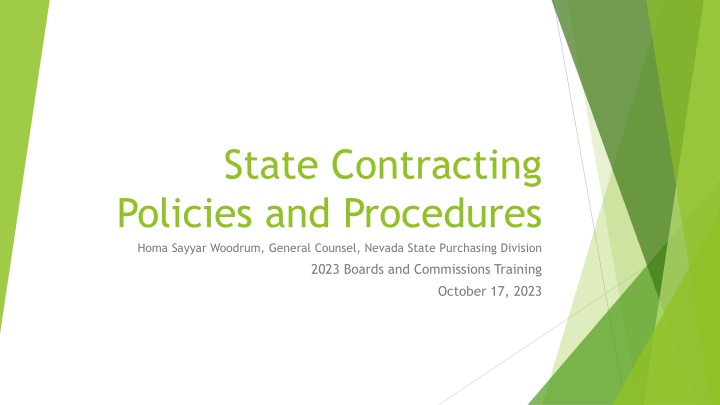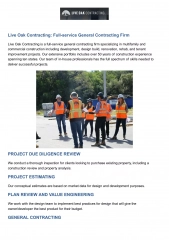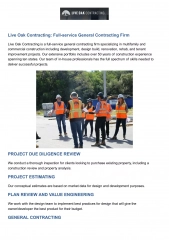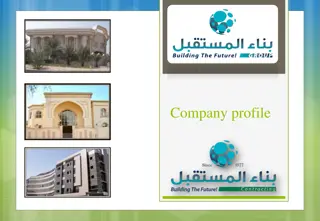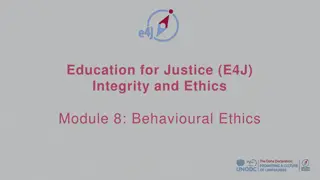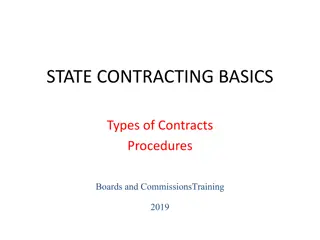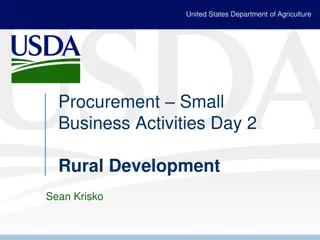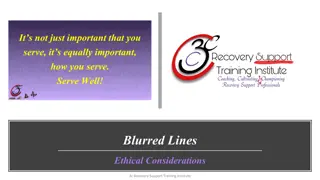State Contracting Policies and Ethical Considerations
Explore key concepts in government contracting outlined by Homa Sayyar Woodrum, General Counsel at Nevada State Purchasing Division, focusing on personal responsibility, ethical considerations, and the importance of following state procurement rules to uphold public trust. Emphasizes the need for fairness, transparency, and engagement throughout the procurement process to ensure good stewardship of state resources.
Download Presentation

Please find below an Image/Link to download the presentation.
The content on the website is provided AS IS for your information and personal use only. It may not be sold, licensed, or shared on other websites without obtaining consent from the author.If you encounter any issues during the download, it is possible that the publisher has removed the file from their server.
You are allowed to download the files provided on this website for personal or commercial use, subject to the condition that they are used lawfully. All files are the property of their respective owners.
The content on the website is provided AS IS for your information and personal use only. It may not be sold, licensed, or shared on other websites without obtaining consent from the author.
E N D
Presentation Transcript
State Contracting Policies and Procedures Homa Sayyar Woodrum, General Counsel, Nevada State Purchasing Division 2023 Boards and Commissions Training October 17, 2023
Key Concepts Watch for Promises Made or Exchanged Government Contracting is Different from the Private Sector Good Stewardship of State Resources Care and be Careful about Contracting Fairness and Transparency Be Engaged Throughout Procurement and Contracting Use Resources to Supplement Your Knowledge
Personal Responsibility NRS 333.810(1) NRS 353.260(2) Contracts contrary to NRS 333 are void Personal liability for agency head and employee not following the rules Misdemeanor bind or attempt to bind the State in any amount in excess of the specific amount provided by law (or in any other manner than provided by law)
Roadmap Mindset Perspective Ethics How Government Contracts are Different Resources Where to Start (and Why) Authority Competition/Transparency Negotiation Contracting Forms/Vehicles
Perspective Matters If you view state policies and procedures as. . . Red tape You will try to cut through it A safety/seat belt VS. You will put it on and keep it on for your journey What do you want your headline to be?
Red Tape vs. Safety/Seat Belts We already know which vendor we want; I don t see why we need to get quotes. Let s see if we can get the best quality and price for the state. Let s go the fastest route to get started. A little extra time will get us to a solid contract. Good business partners secure authorization and funding first. We can just use a retroactive contract. We shouldn t do business with people who won t back up their work. Nothing bad will happen, I don t see why the vendor needs insurance.
State Ethical Considerations Compliance with state procurement rules relates back to ethical obligations of public officers and employees: A public office is a public trust and shall be held for the sole benefit of the people. NRS 281A.020(1)(a). faithful and impartial discharge of the public officer s or employee s public duties. NRS 281A.400(1). See also NRS 281A.400(3) re: contracts. NRS 281A.430 - Contracts in which public officer or employee has interest prohibited; exceptions; request for relief from strict application. NRS 281A.540 Governmental grant, contract or lease and certain actions taken in violation of chapter are voidable; prohibited contract is void; recovery of benefit received as result of violation. Note: Licensed professionals have additional ethical requirements (e.g., Nevada Rules of Professional Conduct for licensed attorneys).
Basic Contracting What Who Offer When Where Acceptance Who are the parties? How Why Consideration What is the deal at hand? When do you start? Finish? Where is the contract based? Why are the parties contracting? How will the parties pay/perform?
Who the state does business with is determined by law Contractors must agree to state terms and meet state requirements What the state contracts for is determined by law Goods and services the state is permitted to purchase Government Contracting is Different When the state contracts is determined by law Guidelines for frequency of re-solicitation and approval timing (BOE) Where the state contracts is determined by law Nevada choice of law (and venue) is a must Why the state must follow contract rules is determined by law Void contracts mean unenforceable terms for clients How the state contracts is determined be law Competitive processes and special approval requirements
If you do not follow Government Contracting rules, a contract could still be created, but the parties may not be who you think: Contracting Law and Government Contracts Co-exist NRS 333.810 Personal liability for contracts not following state processes NRS 353.260 Misdemeanor to exceed budget authority Watch for promises you can t make for example: You tell a vendor to start work now, before the contract is fully approved You promise a vendor you ll work with them without competition You tell a vendor with a contract to add a project and that they ll be paid You promise a vendor payment in advance before work is performed
Procurement Law Includes State Contracting Law Nevada Revised Statutes State Administrative Manual 332 Purchasing: Local Governments 333 Purchasing: State 333A State Performance Contracts 334 Purchasing (Generally) 338 Public Works 353.500-353.630 Installment Purchase/Lease-Purchase 277.080-277.180 Interlocal Agreements Contracts Solicitation Requirements Board of Examiners Requirements Insurance SAM 0326(8) Repealed in 09/2021
Resources Certified Contract Manager (CCM) Course Available through State Purchasing This Training Other recordings also @NevadaAG on YouTube Contact State Purchasing Purchasing.NV.Gov (Toolbox) Work with Attorney(s) Nevada Attorney General s Office, Board Counsel, Purchasing Counsel
Authority (and Limitations on Authority) Agency/board/commission statutes Applicable chapters can depend on the parties Where to Start? Competition/Transparency Formal/Informal Threshold amounts Negotiation Minimizing Risk/Protecting the State Red Flags
Hypothetical: Licensing Fees The Nevada Superhero Licensing Board mentions wanting to build an online licensing system before next calendar year for at least 2,000 licensees at their June meeting. The new Executive Director emails her friend at Interesting Software and is excited to learn that they can set up a system to charge each licensee $50 each year and the fees will fund the system while leaving $25 per applicant in revenue for the board. The E.D. thinks this is a perfect solution and signs a four-year auto-renew contract with a cap on liability for the revenue amount Interesting Software estimates owing the State on a vendor prepared form with Interesting Software in July. At the next Board meeting in October, the E.D. reports that the system is already accepting applications and has brought in $25,000 in revenue from 1,000 users. In November, 1,500 licensees report that their secret identities have been compromised. When the E.D. calls Interesting Software, she learns there has been a data breach and Interesting Software does not carry cyber insurance. Who What When Where Why How
Ask Questions and Follow the Process In our hypothetical, the right mindset would have helped Perceived delay in getting a project started doesn t appreciate what the solicitation and negotiation process can do to help you succeed Following the process (and law) protects the State and Nevadans Best value and the most protection For the Board For the Licensees For the Public
Hypothetical: Licensing Fees Reimagined The new Executive Director emails State Purchasing before the meeting with a licensing system on the agenda for the Nevada Superhero Licensing Board. Purchasing talks her through the process and suggests that she also touch base with board counsel about any administrative or statutory requirements for licensing as well as what delegated authority she has to work on the project. After talking to counsel, the E.D. learns that there is a regulation allowing the board to charge no more than $25 per license, but credit card processing fees are permitted. She writes out the requirements for the system (including the pricing limitations) and gets board approval for the Request for Proposal document. Radioactive Software scores highest among the proposals and can customize their software for $25,000 in total staff time and an annual $12,500 software licensing fee for the four-year term. This will register unlimited users. The resulting contract is on the State form with insurance requirements approved by Risk Management, including heightened cyber coverage, and goes to the Board of Examiners for final signature after the parties and the Deputy Attorney General sign off. After the system goes online, Radioactive Software alerts the E.D. that someone has been attempting to access the system. They ve blocked the attempt, but Radioactive Software uses their cyber policy coverage to bring in an outside forensic team to verify if any users are affected so that they can cover any required notices or damages per the contract.
Authority (and Limitations) What your public body can do What your public body is budgeted to do Having the ability to do something, and the budget to do it, is not the end of the story What do you have to do in order to perform your functions? Limits on authority Process requirements within that authority Competition, transparency, signature authority, etc. What do you have to do with the funds you have? Possible limitations depending on funding source Specific rules about obligated funds Watch for rulemaking issues
Competition All plans for purchasing goods, services, or a combination of goods and services should start with determining your project scope internally For large or small projects, allowing competition helps to ensure best value for the State along with appropriate protections Informal competition for smaller projects can be as simple as getting quotes from vendors Formal competition allows you to go slow to go fast No one wants to realize that their project vision doesn t match industry options halfway through the budget with no system in sight The free Certified Contract Managers course covers the RFP (Request for Proposals) process
Negotiation Don t negotiate against yourself by attempting to skip competition Accept that Vendors and the State have disparate goals Vendor goal: profit State goal: best value and quality (plus performance) NRS 333 bars certain terms entirely Indemnity by the state is not permitted Requiring litigation or arbitration in another state or nation is not permitted No boycott of Israel Counsel for State Purchasing safeguards process concerns, Counsel for the Agency should be involved for client-specific concerns
(Some) Negotiation Red Flags Vendors who want to disclaim any warranty What are you actually purchasing when someone won t promise that their work meets standards? Vendors who want to cap liability to contract value What are the actual concerns for the project and does the amount being paid align with the risk involved? Vendors who want to reduce insurance requirements Consider the risk the State takes on for every reduction in Vendor responsibility Vendors who won t agree to State non-appropriation provisions Remember: contracts cannot exceed authority Vendors who attempt to limit audits and/or public records activity You have obligations that can t be contracted away
Always download the latest version (updated versions in the works) https://purchasing.nv.gov/Contracts/To olBox/#Forms/Templates Short Form Under $100,000 (template still says $50,000) Lacks precedence language for attachments if unedited Contract Forms Long Form Amendments and Assignments Interlocal Don t let the vendor declare that they are a public entity check!
Review and Approval of Forms Contracts must be reviewed by your counsel at the Nevada Attorney General s Office per the State Administrative Manual This includes when there no signature line for counsel License agreements Purchase orders with click through terms Vendor template contracts You may also need to work with Nevada Risk Management related to insurance provisions Your counsel s review does not take the place of following the process Approval as to form does not mean approval as to substance or compliance with solicitation requirements Remember: you could be personally liable Your counsel should work with you about legal questions in the process
Memorandums of Understanding, Letters of Agreement, and More Memorandums of Understanding containing promises are contracts Letters of Agreement are contracts Signing MOUs or LOAs without authority could subject you to personal liability or be a misdemeanor MOUs are great for communication plans with no actual promises or consequences, but some agencies try to use them to circumvent contracting rules (and even Deputy Attorney General review) Volunteer Agreements still have risk implications Grants are often contracts Licenses to use State facilities
Thank you! Resources are available to help every step of the way Ask questions early and often Plan for the worst, hope for the best http://Purchasing.NV.Gov http://Purchasing.NV.Gov State Contracting Basics Video https://www.youtube.com/watch?v=sAJhNVZIx4E
